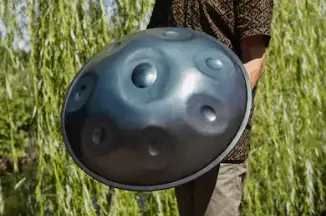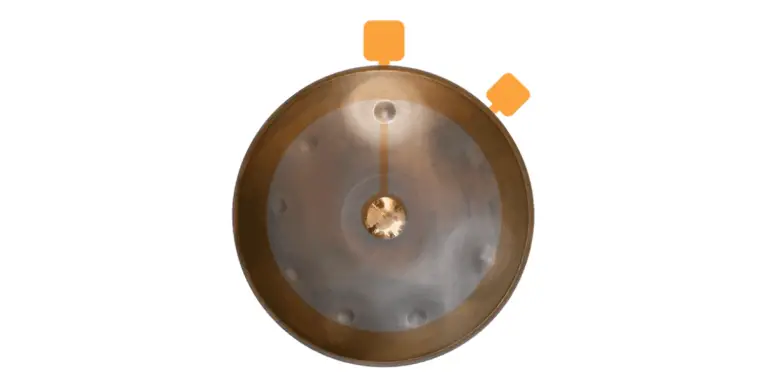Handpan Maintenance | Best Way to Clean a Handpan
One thing you will want to ensure is keeping your handpan in tip-top condition, and a regular cleaning routine is essential in that quest
How to clean a handpan – The best way to clean handpan is to use a microfibre cloth to provide a thorough wipe after each use. If you have not played it for some time, use the same cloth to wipe before playing too.
There are many other considerations in keeping your handpan in the best shape, read on for the best range of tips to ensure you keep your handpan clean.
How to take Care of Handpans
To be honest, taking care of your handpan is not a hugely time-consuming exercise. A good routine, remembering a few simple things will see your handpan taken good care of.
Regular Cleaning Routine
Getting into a routine for each time you use and play your handpan will set you on the right path to a good maintenance routine.
I personally like to wipe my handpan with a microfibre cloth both immediately after I have used it and I mean every time, and by the same token, before I play, I will do the same. Were possible I will always wash and thoroughly dry my hands too.
Keep that microfibre cloth clean as well. Imagine what it can pick up over many months, and consider what you might be rubbing on your handpan each time you use it.
Some people have more active oils in their skins than others and there have been cases, where human skin oil has affected the steel on some handpans. Fortunately, in the case I am thinking of as I write, no long-lasting damage was done, although aesthetically there were some major changes, which actually I thought left the players pan looking quite unique. others might not agree.
Things you will need
- Microfibre cloth
- Rubbing Alcohol
- Patience
It can be labourious or even monotonous to have to wipe down your pan each and every time you play, but it is important to remove any debris or moisture left over after playing.
Rubbing Alcohol can be used and is by many. It is found in most grocery stores, but make sure you use only Isopropyl Alcohol. Personally I am of the opinion this is only essential when not using a microfibre cloth each and every time and you get some more stubborn marks on your pan.
Patience is required. It is a bit like cleaning your teeth. Make a token gesture of cleaning by not spending that extra minute or two and over time you’ll notice a better clean will be required, possibly using other products.
Things You Might Need
- Handpan Oil
- Moisture bag
Handpan Oil is popular, and believe it or not there is a very specific product on the market by the name of Phoenix Oil that has been made for the spcific use on Handpans and nothing else. It helps to keep your handpan dust free and creates a barrier and protection. It is 100% natural.
Moisture absorption bags are a good addition if you handpan has got wet, or if you are in a humid climate. Placing one inside your handpan will help remove further moisture from inside from those tricky to reach places, and having one in your storage bag for traveling will also help prevent moisture build-up in transit.
Things you don’t need
- FrogLube
- Any Abrasive Cloths
- Detergent
There are enough horror stories regarding the use of frog lube and the build-up when applied inside the pan and how it can kill the tone fields as to suggest you never need to use it. Abrasive cloths should be avoided for obvious reasons, and detergent is not necessary. If you want a deeper clean, use rubbing alcohol instead.
How to Prevent Rust on my Handpan
There is but only one thing you need to prevent your handpan from being affected by rust – KEEP IT DRY – STORE IT DRY
The steel [in most cases] will be nitrided, and while it is often described as an ‘anti-rust’ treatment, while that is partially true it is really ‘rust-prevention’ and very effective as it is, nitriding only slows down the process. It does not prevent rust altogether.
Besides any long term damage to the steel will negate the effects of nitriding over time. – So, what to do?
There may be a range fo things you’ve read about how to protect you handpan from rust, but the number one method is ensuring that your handpan is dry, is stored dry and if it does get wet, it is dried thoroughly, outside and especially inside once you have finished playing, or you are storing it away.
Best Storage ideas for my handpan
One might think that because we are talking about a big lump of steel, storage may not be an issue, and it will be hard enough wearing to handle anything – Wrong!, yes Steel is strong, as is your handpan itself, but the tone fields are very fragile. hence the reason rough playing is very much advised against.
So let’s look at the DO NOT’S first.
- Do not store away your handpan is wet
- Do not put in a damp or wet bag
- Do not leave in any bag for a great length of time
- Never leave your handpan in the sun
- Do not leave it where it might be knocked or something could be dropped on it
- Do not leave it anywhere it could possibly fall
What happens if my handpan gets wet?
DRY IT!
No really, that’s all you need really worry about. So long as you ensure it is completely dry before putting away then you will have no trouble at all.
Certainly do not store it wet, or worse still put it in a bag if there is any dampness about it. Placing in a bag will make things far worse.
The outside of the pan is very easy to dry and have visual confirmation that you have done a good job – Not so the inside, so take your time here, ensure you are getting around the inside as much as you possibly can.
It may be worth using a moisture collection bag for a while inside after playing if it has got wet inside and you can’t be 100% confident you have removed all residue inside.
What happens if I leave my handpan in the sun?
It goes without saying, or maybe it doesn’t so I will say it loud and clear – Do not put your handpan in the sun to dry. That is something you could live to regret.
In any case, if the tone fields are somehow affected by playing or leaving the handpan in the sun [as I know you won’t leave it to dry this way], remove it as soon as possible and place somewhere cool. If you are fortunate the steel will cool and the tone fields will return to tune. If not, you’ve got a tuning job for someone.
Better to be safe than sorry, and dry carefully and not leave out in the sun then!






